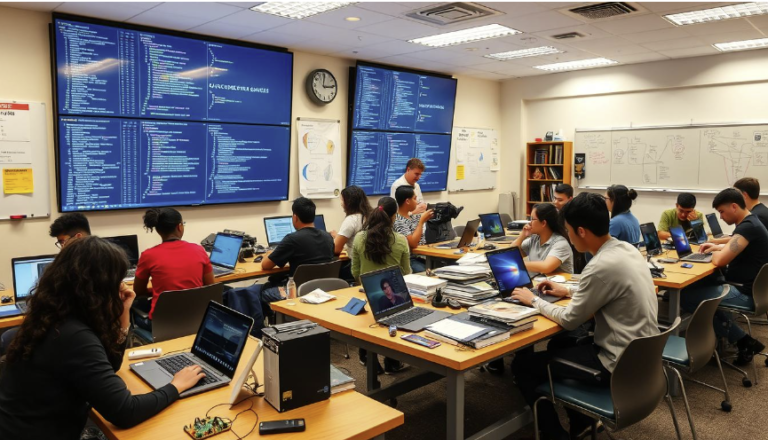Associate Degree in Bioinformatics
Introduction
Bioinformatics is a field that blends biology, computer science, and data analysis. An associate degree in bioinformatics gives you the skills and knowledge for a career in this exciting field. We’ll explore the benefits of an associate degree and the many career paths available in bioinformatics.
Key Takeaways
- Bioinformatics is an interdisciplinary field that merges biology, computer science, and data analysis.
- An associate degree in bioinformatics can open doors to a variety of career paths in the bioinformatics and biotechnology industries.
- The curriculum covers core courses in biology, computer science, and hands-on experience with bioinformatics tools.
- Bioinformatics professionals are in high demand, with a projected growth rate of 9% over the next decade.
- Graduates of an associate degree program can pursue further education or enter the workforce immediately.
What is Bioinformatics?
Bioinformatics is a field that mixes biology and computer science. It helps us understand life’s mysteries. By using data analysis and computational biology, researchers explore huge amounts of biological data. They uncover secrets that were hidden before.
Unraveling the Secrets of Life Through Data
Bioinformatics uses technology to understand biological information. It looks at DNA sequences and protein structures. Researchers use advanced tools to handle and analyze lots of data.
This way of studying life leads to new discoveries. It’s important in genetics, genomics, and molecular biology.
Interdisciplinary Approach: Biology Meets Computer Science
Bioinformatics connects biology and computer science. Bioinformaticians know both fields well. They create new algorithms and tools to understand biological data.
This mix of knowledge leads to big advances in life sciences. It’s what drives many discoveries.
“Bioinformatics is the key to unlocking the secrets of life, one data point at a time.”
Why Pursue an Associate Degree in Bioinformatics?
Getting an associate degree in bioinformatics is a smart move for starting your career. This program mixes biology, computer science, and data analysis. It gives you the skills and knowledge needed to succeed in bioinformatics.
An associate degree in bioinformatics opens up many career opportunities. You can find jobs in pharmaceuticals, biotechnology, research, and universities. The demand for bioinformatics jobs is growing fast, offering great job prospects.
This degree also helps you move up in your education. Many students use it as a stepping stone to a bachelor’s degree. This way, you can deepen your knowledge and skills in bioinformatics.
| Key Benefits of an Associate Degree in Bioinformatics |
|---|
|
By getting an associate degree in bioinformatics, you build a strong base for your career. It’s a chance to start a rewarding and exciting journey in this innovative field. Take the first step towards your future in bioinformatics today.
Career Opportunities in Bioinformatics
Graduates with an associate degree in bioinformatics can find many career paths. They make big contributions in different fields. This includes the pharmaceutical and biotechnology sectors, and research institutions and universities. Bioinformatics experts are key in scientific progress.
Pharmaceutical and Biotechnology Industries
In the pharmaceutical and biotechnology fields, bioinformatics experts are often analysts. They help in making new drugs and treatments. They do genomic research, analyzing big data to find patterns and insights. This helps in personalized medicine and drug development.
Research Institutions and Universities
At research places and universities, bioinformatics graduates work with scientists. They help in making new discoveries. They use their skills in data analysis and computational biology. This supports research in genetics, molecular biology, and evolutionary science.
| Industry | Job Opportunities |
|---|---|
| Pharmaceutical and Biotechnology |
|
| Research Institutions and Universities |
|
“Bioinformatics is a rapidly growing field that offers diverse career opportunities, from drug development to groundbreaking scientific research. The possibilities are truly endless for those with an associate degree in this cutting-edge discipline.”
Curriculum: Building a Strong Foundation
The associate degree in bioinformatics curriculum is made to give students a strong base in biology and computer science. It combines these two areas to prepare students for the fast-changing world of bioinformatics.
Core Courses in Biology and Computer Science
Students in the bioinformatics associate degree program will take a variety of core courses. These cover molecular biology, genetics, and programming, among others. This wide range of courses makes sure graduates understand the science behind bioinformatics and can work with biological data.
Hands-on Experience with Bioinformatics Software
- The curriculum also focuses on hands-on learning with top bioinformatics software and tools.
- Students will get to practice using data analysis and interpretation software. This helps them develop skills that employers look for in bioinformatics.
- This practical experience prepares graduates to face real-world challenges and start their bioinformatics careers confidently.
“The bioinformatics curriculum at our college is designed to provide a perfect blend of theoretical knowledge and practical skills, equipping students with the tools and expertise they need to succeed in this dynamic field.”
Bioinformatics: Revolutionizing Healthcare
Bioinformatics is changing healthcare fast. It combines data analysis and computational tools to improve personalized medicine, genomic research, and data-driven healthcare solutions.
Bioinformatics in healthcare uses genomic data for personalized treatments. It looks at a person’s genes to find what’s unique about them. This helps doctors give treatments that really work for each person.
Bioinformatics leads in genomic research. It uses computers to find secrets in the human genome. This helps find new ways to diagnose and treat diseases.
Bioinformatics in healthcare also changes how we use data. It mixes medical records, clinical data, and genomic info. This helps predict diseases and make healthcare better.
The future of healthcare looks bright with bioinformatics. It uses data and computers to make medicine more personal and effective.
Skills You’ll Acquire
Getting an associate degree in bioinformatics gives you many useful skills. You’ll learn about data analysis, programming, and database management. These skills are in high demand in the bioinformatics field.
Data Analysis and Interpretation
In bioinformatics, you’ll work with big biological datasets. You’ll use algorithms and software to find important insights. These skills help make decisions and push forward in areas like genomics and personalized medicine.
Programming and Database Management
Bioinformatics needs strong programming and database skills. You’ll learn to code in languages like Python and SQL. This lets you automate tasks, create tools, and manage big databases.
During your associate degree, you’ll use these bioinformatics skills in real projects. You’ll also do internships and research. This hands-on experience gets you ready for jobs in data analysis, programming, and database management.
“The most valuable skills in bioinformatics are the ability to think critically, solve complex problems, and communicate scientific findings effectively.”
Continuing Education Pathways
Getting an associate degree in bioinformatics is just the start. Many graduates then go for a bioinformatics bachelor’s degree or related fields like computer science or biology. This step opens up advanced roles and access to graduate programs like master’s and doctoral degrees.
Going further in your education can boost your career. With a bachelor’s or graduate degree, you can take on more roles. These include research, data analysis, and project management. More education makes you more competitive and valuable in the job market.
If you want to deepen your skills or explore new paths, there are many options. Universities and colleges offer flexible programs. These include online and part-time options for those who work.
| Degree Level | Potential Careers | Average Salary* |
|---|---|---|
| Associate Degree | Bioinformatics Technician, Research Assistant | $50,000 – $60,000 |
| Bachelor’s Degree | Bioinformatics Analyst, Biostatistician, Computational Biologist | $65,000 – $80,000 |
| Master’s Degree | Bioinformatics Scientist, Bioinformatics Manager, Bioinformatics Consultant | $80,000 – $100,000 |
| Doctoral Degree | Bioinformatics Researcher, Bioinformatics Professor, Chief Bioinformatics Officer | $100,000 – $150,000+ |
*Salary ranges may vary based on location, industry, and level of experience.
“Continuing education in bioinformatics opens up a world of opportunities for career advancement and personal growth. The field is rapidly evolving, and staying ahead of the curve requires a commitment to lifelong learning.”
Choosing the Right Program
When picking an associate degree in bioinformatics, think about a few key things. Look at the program’s accreditation and reputation. Also, decide if you want it online or on-campus.
Accreditation and Reputation
Make sure the bioinformatics program is accredited by groups like CAHIIM or ABET. This means it meets high standards. Also, check if the program is respected in the field. This ensures it will help you succeed.
Online vs. On-Campus Options
- Think about what you prefer: online or on-campus. Online lets you study at your own pace. On-campus offers face-to-face learning and lab work.
- Check if the online program has good virtual labs and interactive materials. It should also let you work with others.
- Online learning needs you to be self-motivated. Make sure you can handle it.
By looking at accreditation, reputation, and format, you can choose the right bioinformatics program. This choice will help you reach your goals.
| Criteria | Online Bioinformatics Programs | On-Campus Bioinformatics Programs |
|---|---|---|
| Flexibility | High | Lower |
| Hands-on Experience | Limited | Extensive |
| Peer Interaction | Virtual | In-person |
| Accreditation | Ensure program is accredited | Ensure program is accredited |
Conclusion
An associate degree in bioinformatics can launch you into a thrilling career. It combines biology, computer science, and data analysis. This makes bioinformatics experts key in scientific research, healthcare, and new technologies.
If you’re interested in the pharmaceutical industry, research, or data-driven healthcare, this degree is for you. It gives you the skills and knowledge to succeed in this fast-paced field.
The need for bioinformatics experts is growing. An associate degree gives you a strong base for many career paths. You’ll learn valuable skills like data analysis, programming, and database management.
These skills are in high demand across different industries. Plus, this degree can lead to further education. You can move on to a bachelor’s or master’s degree in bioinformatics or related fields.
Choosing an associate degree in bioinformatics is a smart choice. It can lead to a rewarding and impactful career. You’ll use data, technology, and science to make important discoveries and improve healthcare.
FAQ
What is Bioinformatics?
Bioinformatics combines biology, computer science, and data analysis. It uses computers to handle and study biological data. This includes DNA sequences, protein structures, and how genes work.
Why Pursue an Associate Degree in Bioinformatics?
An associate degree in bioinformatics gives you a strong start. It prepares you for entry-level jobs or more education. You’ll learn biology, computer science, and data analysis, making you ready for the bioinformatics field.
What Career Opportunities are Available in Bioinformatics?
With an associate degree in bioinformatics, you can find many jobs. You might work in the pharmaceutical or biotech fields as a bioinformatics analyst. Or, you could work in research or universities, helping with important studies and working with scientists.
What Will I Learn in the Bioinformatics Curriculum?
The bioinformatics curriculum covers biology and computer science. You’ll study molecular biology, genetics, and programming. Plus, you’ll get hands-on experience with bioinformatics tools for data analysis.
How is Bioinformatics Revolutionizing Healthcare?
Bioinformatics is changing healthcare a lot. It uses data and computers to help with personalized medicine and genomic research. This leads to better care and a more efficient healthcare system.
What Skills Will I Acquire with an Associate Degree in Bioinformatics?
An associate degree in bioinformatics teaches you many skills. You’ll learn data analysis, programming, and database management. You’ll also know how to work with big biological datasets and use bioinformatics software.
What Continuing Education Pathways are Available?
Getting an associate degree in bioinformatics is just the start. Many go on to get a bachelor’s degree in bioinformatics or related fields. This can lead to more advanced jobs or even graduate school.
How Do I Choose the Right Bioinformatics Program?
Choosing a bioinformatics program needs careful thought. Look at accreditation, reputation, and if it’s online or on-campus. Make sure it’s accredited and has a good reputation. Also, think about what you prefer in a learning environment.





